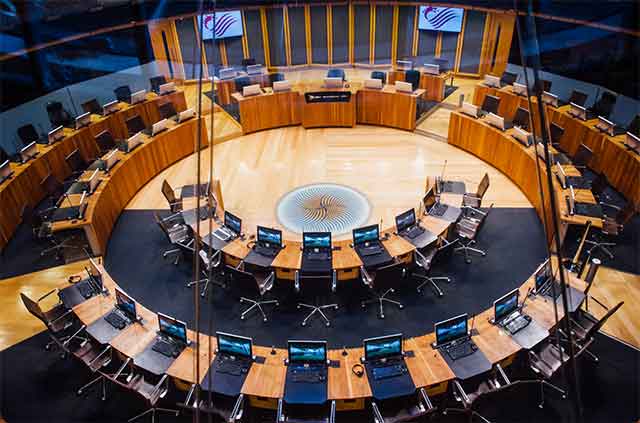Senedd members called for Owain’s law, in memory of a young father, to ensure a gold-standard approach to preserving human tissue for other cancer patients in future.
Hefin David led a debate on a cross-party motion on July 2 calling for a law named after his Caerphilly constituent Owain James, who sadly died last year.
He said: “Owain was only 34 years old when he was diagnosed with a 14cm, malignant, grade-four brain tumour in his right frontal lobe. His neurosurgeon said it was one of the biggest tumours she’d ever come across in her professional career.
“It was an absolutely devastating blow to Owain, his wife Ellie, who is in the public gallery today, and his daughter Amelia, who at the time was only 18 months old. Until then, Owain had always been a fit and healthy young man.”
Dr David said the family turned to private treatment and found a personalised vaccine that used a patient’s tumour tissue to educate the immune system to recognise cancerous cells.
‘Regret’
He told the Senedd: “The problem here, however, was that Owain needed fresh frozen tumour tissue to develop a sufficient dose of the vaccine. Owain had had 7cm of tissue surgically removed but, unfortunately, only 1cm of this was fresh frozen and could be used.”
The Caerphilly Senedd member explained Owain only had three doses of vaccine when it should have been more like 30 doses, but he initially made a remarkable recovery.
“Unfortunately, metastasis caused his tumour to recur elsewhere,” he said. “This time, the tumour was too aggressive and Owain sadly passed away in June 2024.
“Ellie, 35 years of age, now lives with the regret that they were only able to develop and obtain enough doses for those three vaccines.
“Had there been more, we feel that Owain would still be alive today.”
‘Biggest killer’
Dr David said fresh frozen tissue is regarded as the gold-standard approach and can be used for vaccines, therapies, research and genome sequencing.
He explained: “This kind of use, though, can only be done when the tumour is fresh frozen, which it wasn’t in Owain’s case. Owain’s law seeks to address this. It seeks to make this the default process for storing surgically removed tissue in Wales.”
Plaid Cymru’s Peredur Owen Griffiths, who represents South Wales East, said: “My mother also died from a brain tumour, so it’s an issue that is deeply personal for me.
“Brain tumours remain the biggest cancer killer of children and adults under 40, yet they receive just one per cent of national cancer research funding.
“Families like mine and Owain’s are let down not only by research but also by how precious tumour tissue is managed. Owain’s law will enshrine a vital principle that patients and families must be fully informed and able to consent.”
‘Devastating’
Mr Owen Griffiths added: “This is more than a technical protocol. This is a matter of dignity, respect and hope for families facing devastating diagnoses.”
The Conservatives’ Altaf Hussain, a former surgeon, supported Owain’s law but emphasised the importance of accommodations for religious preferences.
Mabon ap Gwynfor, Plaid Cymru’s shadow health secretary, expressed concerns about long waits before receiving a diagnosis and a lack of diagnostic machines such as scanners.
Mr ap Gwynfor told the Senedd: “Even after receiving a diagnosis, we have a lack of specialist treatment centres – with far too many of our patients having to travel very long distances at times of weakness to receive their treatment.”
Backing Owain’s law, he said: “This proposal does reflect two core principles at the heart of our NHS. The first is that the NHS belongs to the public…. Second, it’s the voice of the patient, their concerns, their views, that should be at the heart of every decision made.”
‘Unintended consequences’
Jeremy Miles, for the Welsh Government, stressed the need to proceed with care and warned a legal requirement to freeze all brain tumour tissue risks unintended consequences.
Wales’ health secretary said: “Clinical teams already use their expert judgment to balance diagnostic needs with the potential for research and novel therapies.
“Overriding that clinical discretion through legislation could compromise timely diagnosis or create conflict where tissue volume is limited, which is why the government does not believe that the case is made for legislation.”
While the non-binding motion was agreed unanimously, Owain’s law is unlikely to proceed without Welsh ministers’ full support. But Dr David argued the UK and other countries will eventually introduce such a law as the availability of tissue becomes key to treatment.
Closing the debate, he said: “Let’s remember Owain for everything he’s done today. Even in his passing, he’s contributed to the debate on keeping patients alive for longer.”

